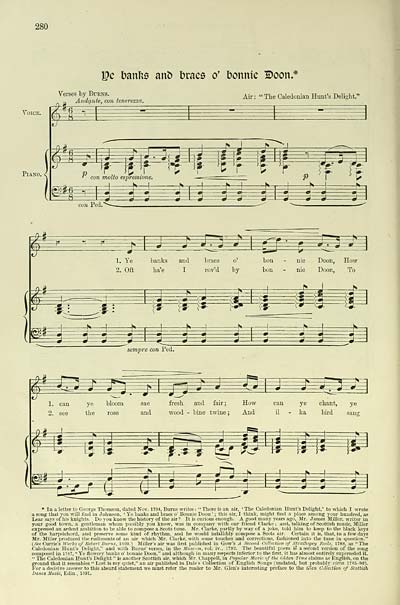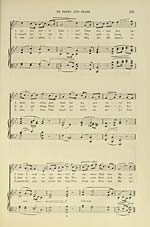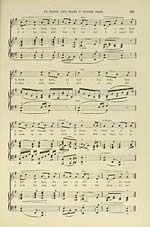Glen Collection of printed music > Printed music > Minstrelsy of Scotland
(300) Page 280 - Ye banks and braes o' bonnie Doon
Download files
Complete book:
Individual page:
Thumbnail gallery: Grid view | List view

280
Voice.
Piano.
l?e "bnriks anb brace o* bonnie 2)oon.''
Verses by Burns.
Andante, con ienerezza.
Air : " The Caledonian Hunt's Delight."
I
i
:S^!t
4 — q >
i
-a^^
\$
1. Ye
2. Oft
banks and
ha'e I
braes
rov'd
by
bon
bon
nie
nie
Doon,
Doon,
;:S!=vd=
How
To
-m A-*! (r^ I'-S V^ i-»i ^-m )-%.-
fe
.^:
3 =j 5^
3^3:
3^E
sempre con Fed.
^
J=^^-J-^
sae
and
fresh and fair; How can ye chant, ye
■wood - bine twine ; And il - ka bird sang
l^^^^^^^^i^^^
^^
^=3=t
t? — r-
3 ZIZ3ZZ;
3E
^^^=g=S
• In a letter to George Thomson, dated Nov. 1794, Burns writes: "There is an air, 'The Caledonian Hunt's Delight,' to which I wrote
a song that you will find in Johnson, ' Ye banks and braes o' Bonnie Doon ' ; this air, I think, might find a place among your hundred, as
Lear says of his knights. Do you know the history of the air? It is curious enough. A ^ood many years ago, Mr. James Miller, writer in
your good town, a gentleman whom possibly you know, was in conipany with our friend Clarke; and, talking of Scottish music, 3Iiller
expressed an ardent ambition to be able to compose a Scots tune- Mr. Clarke, partly by way of a joke, told him to keep to the black keys
of the harpsichord, and preserve some kind of rhythm, and he would inlallibly compose a Scots air. Certain it ie, that, in a few days
Mr. Miller produced the rudiments of an air, which Mr. Clarke, with some touches and corrections, fashioned into the tune in question."
(See Currie's Works of Robert Burns, ISOO.) Miller's air was first published in Gow's -1 Second Collection of Strathspey Reels, 1T88, as "The
Caledonian Hunt's Delight," and with Burns' verses, in the Muscnn, vol. iv., 1792. The beautiful poem is a second version of tlie song
composed in 1787, " Ye flowery banks o' bonnie Doon," and although in many respects inferior to the first, it has almost entirely superseded it.
" The Caledonian Hunt's Delight " is another Scottish air, which iMr. Chapp'ell, in Popular Music of the olden Time claims as English, on the
ground that it resembles " Lost is my quiet," an air published in Dale's Collection of English Songs (undated, but probably circa 1785-90).
For a decisive answer to this absurd statement we most refer the reader to Mr. Glen's interesting preface to the Glen Collection of Scottish
Dance Music, Edin., 1S91,
Voice.
Piano.
l?e "bnriks anb brace o* bonnie 2)oon.''
Verses by Burns.
Andante, con ienerezza.
Air : " The Caledonian Hunt's Delight."
I
i
:S^!t
4 — q >
i
-a^^
\$
1. Ye
2. Oft
banks and
ha'e I
braes
rov'd
by
bon
bon
nie
nie
Doon,
Doon,
;:S!=vd=
How
To
-m A-*! (r^ I'-S V^ i-»i ^-m )-%.-
fe
.^:
3 =j 5^
3^3:
3^E
sempre con Fed.
^
J=^^-J-^
sae
and
fresh and fair; How can ye chant, ye
■wood - bine twine ; And il - ka bird sang
l^^^^^^^^i^^^
^^
^=3=t
t? — r-
3 ZIZ3ZZ;
3E
^^^=g=S
• In a letter to George Thomson, dated Nov. 1794, Burns writes: "There is an air, 'The Caledonian Hunt's Delight,' to which I wrote
a song that you will find in Johnson, ' Ye banks and braes o' Bonnie Doon ' ; this air, I think, might find a place among your hundred, as
Lear says of his knights. Do you know the history of the air? It is curious enough. A ^ood many years ago, Mr. James Miller, writer in
your good town, a gentleman whom possibly you know, was in conipany with our friend Clarke; and, talking of Scottish music, 3Iiller
expressed an ardent ambition to be able to compose a Scots tune- Mr. Clarke, partly by way of a joke, told him to keep to the black keys
of the harpsichord, and preserve some kind of rhythm, and he would inlallibly compose a Scots air. Certain it ie, that, in a few days
Mr. Miller produced the rudiments of an air, which Mr. Clarke, with some touches and corrections, fashioned into the tune in question."
(See Currie's Works of Robert Burns, ISOO.) Miller's air was first published in Gow's -1 Second Collection of Strathspey Reels, 1T88, as "The
Caledonian Hunt's Delight," and with Burns' verses, in the Muscnn, vol. iv., 1792. The beautiful poem is a second version of tlie song
composed in 1787, " Ye flowery banks o' bonnie Doon," and although in many respects inferior to the first, it has almost entirely superseded it.
" The Caledonian Hunt's Delight " is another Scottish air, which iMr. Chapp'ell, in Popular Music of the olden Time claims as English, on the
ground that it resembles " Lost is my quiet," an air published in Dale's Collection of English Songs (undated, but probably circa 1785-90).
For a decisive answer to this absurd statement we most refer the reader to Mr. Glen's interesting preface to the Glen Collection of Scottish
Dance Music, Edin., 1S91,
Set display mode to: Large image | Transcription
Images and transcriptions on this page, including medium image downloads, may be used under the Creative Commons Attribution 4.0 International Licence unless otherwise stated. ![]()
| Special collections of printed music > Glen Collection of printed music > Printed music > Minstrelsy of Scotland > (300) Page 280 - Ye banks and braes o' bonnie Doon |
|---|
| Permanent URL | https://digital.nls.uk/91381718 |
|---|
| Description | Scottish songs and music of the 18th and early 19th centuries, including music for the Highland bagpipe. These are selected items from the collection of John Glen (1833 to 1904). Also includes a few manuscripts, some treatises, and other books on the subject. |
|---|
| Description | The Glen Collection and the Inglis Collection represent mainly 18th and 19th century Scottish music, including Scottish songs. The collections of Berlioz and Verdi collected by bibliographer Cecil Hopkinson contain contemporary and later editions of the works of the two composers Berlioz and Verdi. |
|---|

